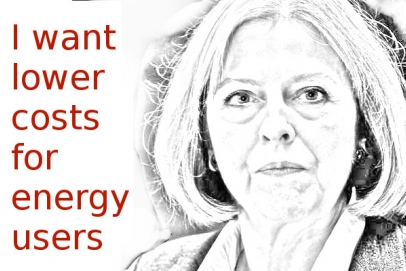Dear Theresa, Get Cracking On Fracking
After Brexit, the UK is being tipped to shift energy policy to favour domestic production including so-called fracking for gas. A temporary ban was introduced in 2011 on the hydraulic fracturing – or “fracking” – technology used to extract gas from shale rock, but sections of the industry hope for support from new prime minister Theresa May. Stephen Bowler, chief executive of London-listed shale gas developer IGas, told Reuters that Brexit made the case for shale more vital: “An independent Britain needs an independent supply of energy. Security of supply becomes even more important now.” --Karolin Schaps, Reuters, 20 July 2016
Ineos, the $50bn petrochemicals giant controlled by British billionaire Jim Ratcliffe, aims to accelerate shale gas development in the UK by lodging as many as 30 planning applications to drill test wells in the next six months. Tom Crotty, a director at Ineos, said the company hoped to start drilling in the north of England early next year and could begin extracting gas in about 18 months through the controversial technique known as fracking. --Peggy Hollinger, Financial Times, 17 July 2016
For the US to sell gas to the energy-rich Middle East might seem like sending coal to Newcastle, but it has started to happen as the American shale revolution upends the global flows of resources. Two cargoes of US liquefied natural gas from Cheniere Energy’s Sabine Pass plant in Louisiana have been delivered to Kuwait and Dubai in recent months to meet the rapidly growing demand for energy. --Ed Crooks, Financial Times, 18 July 2016
Fracking has the potential create jobs and boost Britain’s economy after Brexit. Theresa May must be seen as a champion of fracking to get the country’s economy back on track. Mrs May must be seen as a champion for fracking, debunking the propaganda of the small cabal of vocal, well-funded green campaigners and hammer home the message that it is in our broader national interest to frack. If, as she says, she really cares about the needs of ordinary working people, this is her quickest, cheapest way to help them. --James Delingpole, The Sun, 20 July 2016
The biggest source of inequality is government intervention on behalf of crony capitalism, not the free market. Our current “industrial strategy” for energy — to subsidise offshore wind, solar, biomass and nuclear — is responsible for the fact that domestic electricity prices are the seventh highest of the 29 countries that are members of the International Energy Agency, 21 per cent above the median, while our industrial energy prices are fourth highest and 43 per cent above the median. Domestic electricity bills are a higher proportion of household budgets for the poor than for the rich, so this policy is regressive; doubly so, because the wind and solar subsidies mostly go to the rich. High industrial electricity bills are a big part of the cost of aluminium, steel and other blue-collar industries, and bear a heavy responsibility for the painful closures at Lynemouth and Redcar. The policy has been tough for blue-collar workers and poorer people. --Matt Ridley, The Times, 18 July 2016
Philippines President Duterte on Monday said his administration would not honor the historic Paris Agreement on climate change that the Philippines adopted along with about 200 countries in December 2015, saying the covenant was “stupid” and “absurd.” --Marlon Ramos, Philippine Daily Inquirer, 18 July 2016

No comments:
Post a Comment